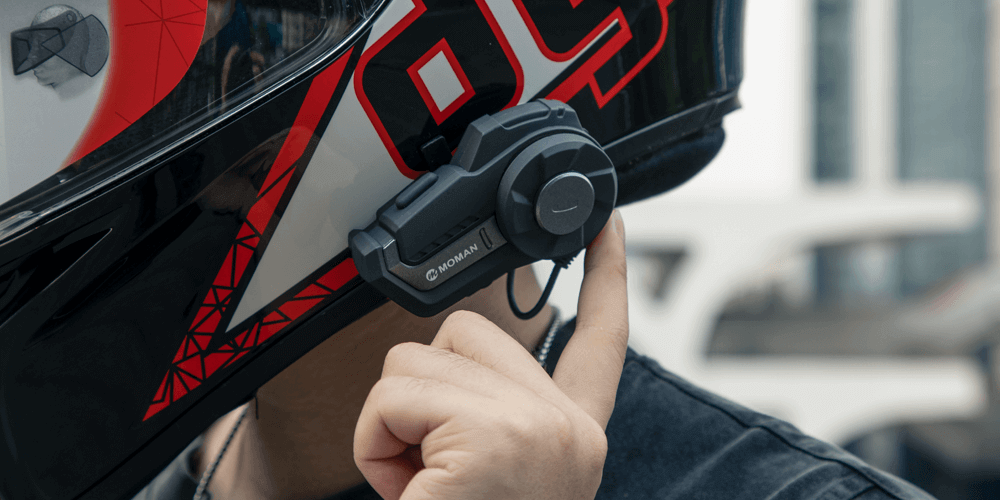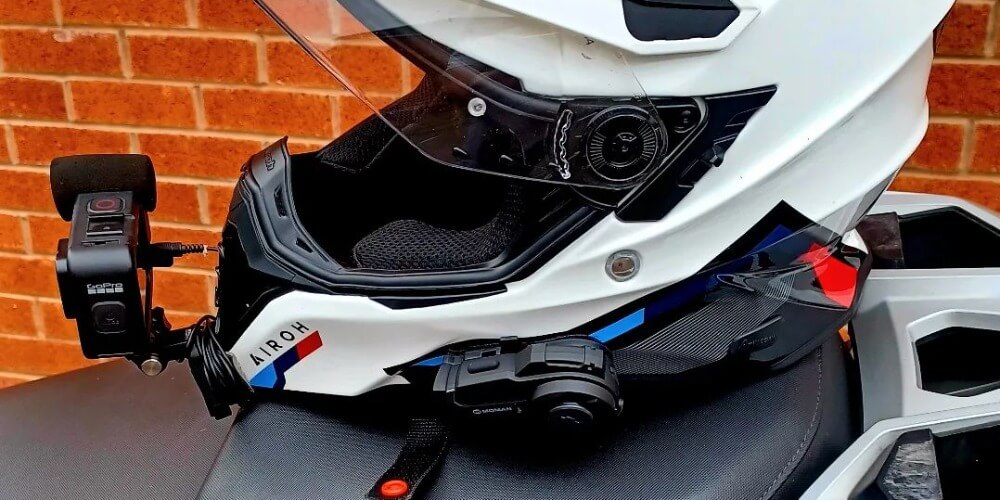Helmet communicators for motorcycles give riders an easy method to keep in touch without having to shout over the loud engine noise. Communication is crucial when riding on a road. How do motorcycle helmet communications work? And how many types of them, what are their advantages and disadvantages? Let's examine this.
- How do motorcycle helmet communications work?
- Three kinds of motorbike helmet communication systems
- Pros and cons of using a helmet communicator for motorcyclists

How do motorcycle helmet communications work?
Motorcycle helmet communications essentially refer to the communication device made to allow riders to communicate clearly and unobstructedly with each other. They can be an intercom, headset, or helmet-integrated system, which ensures conversation is many feet away. It usually works by using Bluetooth or Mesh wireless tech to link compatible devices, making one-on-one and group talks easier.
One excellent illustration of how sophisticated these gadgets have evolved is the intercom systems. These systems provide cyclists with exceptional sound quality even in the face of constant wind noise, allowing them to stay connected the entire way.
Motorcycle helmets are the ideal place for Bluetooth intercoms to be fastened. There are no special instruments needed for this very easy technique. After installation, the system may establish a connection with your smartphone, allowing you to enjoy your trip while taking calls, listening to music, and even following GPS directions.
Three kinds of motorbike helmet communication systems
While traveling, daily riding, or racing, motorcycle helmet communications are a terrific way to remain in touch. Riders may select the best intercom system that meets their demands and budget from a variety of wired, wireless, and integrated, each with varying features.
Wired intercom or headset
The wired motorcycle helmet communicator is one of the most fundamental kinds of intercom systems. They are usually the least expensive choice and need a wired connection between the two helmets. But while riding, the cables might be awkward and obstructive.
Wireless two-way communication system
Compared to the wired type, the modern wireless motorbike communication for helmets comes with greater convenience and safety in operation. Also, they come with several cutting-edge capabilities like voice-activated function, music streaming, wireless music sharing, and GPS guidance and navigation.
Mesh vs Bluetooth wireless communications, which is better?
- Mesh: You may keep in touch with several riders in a group by using a dynamic mesh system, which creates a wide-ranging communication network via a network of helmets. Although they are expensive, their sound quality and range are the greatest. They also include capabilities like music sharing, group conference calls, and GPS navigation.
- Bluetooth: As long as they are within range, the leader of a motorcycle group utilizing a Bluetooth communication system will utilize their device to establish a connection with the next closest rider. After that, the second rider will transfer the chain to the rider who is closest to them, and so on, until all of the riders are linked to the same chain. Without taking their hands off the handlebars, each member of the group will be able to speak without restriction.
- Which is better: Bluetooth and mesh technologies both employ radio frequencies for data transmission. However, only data sent to two direct links is sent via Bluetooth. Mesh builds a network of various connections among all members of the group. In theory, this might not seem like much, but in practice, it can make all the difference in the world when driving.
Helmet-integrated communicator and microphone system
The integrated communication system in the motorcycle helmet is the third option for riders. The microphone and speaker are usually built into the helmet itself. Although they are frequently the priciest choice, they are also the most practical and user-friendly. Because they are positioned near to one another, these helmets' built-in intercoms have premium audio quality.

Pros and cons of using a helmet communicator for motorcyclists
Now that we've covered how motorcycle helmet communication works, let's assess how worthy they are. Prospective purchasers frequently question whether these gadgets are a good investment. Here we will talk about its benefits and drawbacks.
Pros of motorcycle helmet rider-to-rider communication
It provides convenient hands-free communication: A motorbike intercom system may make it simple to make calls, get instructions, or simply talk with other riders while out on a lengthy trip.
It improves traffic safety: Riders who have voice prompt capabilities can still get crucial information while maintaining their attention on the road. This is particularly helpful in big gatherings when ongoing communication might avert accidents.
It ensures high-clarity music streaming: The enhanced sound quality is another important benefit. Technology that reduces background noise and produces high-quality audio makes music playing and communication much more enjoyable, especially while traveling at fast speeds.、
Cons of helmet intercom system for motorbike riders
Great cost: Motorcycle intercom systems for communication have a similar price range. Some riders may find that investing hundreds of dollars in high-end models is a substantial financial commitment.
Limited compatibility: Not every helmet communication system for riders is compatible with motorcycle helmets. To utilize the device, riders might need to modify their helmets or buy extra gear.
Distractibility to riding: The music or the talk might divert riders' attention from the road. Accident risk may rise as a result of this.
Necessary recharging: Depending on the model and amount of use, motorcycle helmet rider-to-passenger intercoms require power to operate. The battery life might vary. It can be necessary for riders to regularly change the batteries or recharge them.

Conclusion
Hope this guide can help you get to know how motorcycle helmet communications work better. With some perseverance user-friendly interfaces and thorough user manuals, you can get to utilize this mini device for a delightful motorcycling journey.






